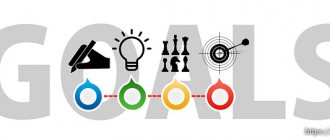Each of us has our own model of the world, which, according to Stephen Covey’s apt comparison, can be likened to a map. A tiny topographical error on the map where we mark our tactical and strategic goals can lead to someone else's goal. And we will only know about this when we get to our destination.
At the same time, initially being confident that we are moving in the right direction, we will exert all our strength and energy, spend a lot of time, and risk everything in order not to be late. And as a result, we will still end up in the wrong place.
And all because a tiny topographical error crept into the map. It’s also good if this is a tactical map where our current small goals are marked. What if there is a mistake in the map, where the red thread indicates the “autobahn” to the goal of our whole life?
Some will try to argue: happiness is a relative concept; you can be happy here and now by changing your attitude to reality?
But let’s think, will the fact that we will gain the opportunity to “get high” anywhere on the planet help us get closer to our goal? Therefore, Covey corrects, solving the problem of setting and achieving goals, as well as defining our main mission, does not lie in the plane of our attitude towards it.
Epitaph as a method of finding purpose according to Stephen Covey
You need to edit the map of your life. Only in this case will our persistence and efforts, multiplied by the correct attitude towards current problems and situations, be rewarded. The accuracy of our map determines the success of our personal mission.
Each of us has two sets of such cards - those that we correlate with reality and those that reflect our values and ideals. And we check everything that happens to us with our maps. Thus, the main question that each of us asks ourselves at one time is how to determine our priorities, values, mission? How to find your map and mark your path on it?
Values and ultimate experiences
You should begin to implement any tactical or strategic decision only when the final goal is known. And the amount of responsibility that a decision imposes on a person is directly proportional to the scale of the final goal.
In order to make an adequate strategic decision and determine what goals we would like to achieve, we first need to decide what is of significant value to us in life, that is, to formulate our life values.
The role of practical life instructions proposed by Stephen Covey can be played by a “Declaration of Personal Mission”, in which you formulate your main tasks in this world - what is of decisive importance to us and what we intend to achieve.
A consistent logical transition from current small tasks to larger-scale goals that encompass them can allow a more specific definition of significant values. For example: “Why am I mastering these exercises?
Obviously, to become healthier, get rid of painful addictions and increase your energy level. ... Why do I need all this? – I intend to devote more time to work and do it faster and better, this will help me improve the quality of sleep and rest. ... Why is this fundamentally important to me? “I intend to achieve independence and freedom.” So, in just 3-4 consecutive logical moves, we can get closer to the level of global principles, goals and values that guide us.
Having clarified your goals, you need to prioritize them. So, for example, among the values we mentioned family and career. Let's try to simulate a situation in which we have to choose between our values. Let this be an urgent phone call obliging us to immediately go to the airport to conclude a contract that will determine our entire future career. The client is ready to meet and he only has half an hour before his flight.
We understand that fate gives us a chance and we cannot miss it. We get into the car, and then another call comes - from the hospital where our child ended up after a car accident. Being in a state of shock, he asks his father to come. Refusal, as doctors explained, can cause serious complications with unpredictable consequences.
Thus, we imagine ourselves in a situation where there can be only one decision and we will have to make a choice in favor of values that are more meaningful to us. And this choice for us will mean not just a decision - it will be an act committed against the backdrop of extreme experiences. It is in actions performed in such extreme situations that a person’s personality is formed. Having made a difficult choice in favor of some values one day, we, guided by the experience gained, will be able to apply the acquired knowledge in everyday life. Of course, in this case, the alternative to which we preferred another choice in the limiting situation is not canceled. It only shifts in time to the future with a decrease in the likelihood of its implementation. By performing everyday micro-actions, we maintain the logic of choice and, thereby, implement our own, and not someone else’s, values.
An important addition to the personal mission are the principles that form the basis of our actions in various directions. They can be compared to the basis of our personal strategy. This set of principles will help you formulate a strategy for personal and professional growth. This also includes the principles of decision-making and ethical standards that we intend to adhere to in everyday life and activities.
The first step in formulating your personal goals, personal aspirations, is deciphering the signals that your inner voice gives you.
This can be done by asking "test" questions (we'll look at these later). Despite the fact that we all have an inner voice, we do not always hear it because: most of us are unable to hear this voice due to the fact that we pay too much attention to the outside world and the inner voice is drowned out by the “noise” from our environment . To achieve this, they recommend the following:
Set aside half an hour of free time, find a quiet place where no one will disturb you, sit down, close your eyes, put yourself in the most relaxed state and open yourself to all those mental images that come to you. Imagine that you are in a garden and that a wise man approaches you. After meeting, you ask him those questions where you need advice. Listen carefully to what the sage sees fit to tell you. The answers may seem surprising to you. They reflect what we have to say to ourselves, but can only be heard when our inner voice takes the form of symbols available to us. Using metaphors will allow you to awaken more vivid and original images.
By writing down your mission, vision, key roles and goals, you are putting yourself in front of a mirror and clarifying your own interests. This will allow you to come up with extraordinary ideas, enhance your learning abilities and achieve greater success in your activities. A better understanding of one's self-image and a deeper knowledge of one's personality lead to increased learning abilities. To this end, we must ask ourselves three main questions and be prepared to answer them: Who am I? Why do I exist on Earth? What am I aiming for? These questions affect our personal goals. When expressing your mission and vision, you should use positive language and the present tense, as if everything is happening now.
Personal mission
Who am I? What is my life philosophy? Why do I exist on Earth? What goals is my whole life dedicated to achieving? What am I living for? What are my deepest aspirations? Why do I do what I do? What extraordinary talents do I have? At what stage of my personality development am I currently? What are my core values?
Personal vision
What am I aiming for? What values and principles do I live by? What goals do I want to help achieve? What do I want to achieve? What are my long-term intentions? What is my ideal? What ideas do I support? What do I believe? What contribution am I trying to make to society? How do I want to find my special place in society? How do I see myself (my image and my own value)?
A personal mission statement includes your life philosophy and the main purpose of your life. It contains what you live for, what constitutes your most cherished aspirations and plays the role of a kind of “ethical compass” that sets the direction of your life. In order to express your mission in words, you will need to determine what you like and what gives you satisfaction. A personal vision describes what you strive for, what values and principles guide your development, what goals you want to devote your life to, what ideal personal characteristics you would like to have, what qualities you would like to have if you could fully achieve an ideal image, what are your ideals in the professional sphere, environment, health, etc. Mission and vision are the verbal expression of your inner aspirations. Thus, your inner voice and your strong beliefs about what your life should be play an important role in determining your personal goals. Core roles describe the behaviors and characterize the various life roles that lead you to achieve your personal mission and vision.
It is desirable that the mission and vision statement meet the following criteria:
• Emphasis on friendliness.
• The mission should be short, clear, simple and stated in the present tense. It should be so specific that it can be used as a guide to action.
• The mission and vision must be unique to everyone and recognizable to others.
• The mission and vision should be ethical, emphasizing skills, principles, values and rules such as honesty, reliability, responsibility, mutual assistance, trust, sincerity, teamwork and other recognized values. Integrity, the quality that determines our ability to live from our inner truth, is very often included in mission statements.
• Mission and vision statements should be positive, human-appealing, and long-lasting.
• The vision must be ambitious, it must inspire action and provide direction for personal initiative and creativity.
• Directive nature of the vision. It guides a person's inner world and determines what actions a person should take in the present in order to achieve the best results in the future.
• Vision reflects how a person wants to find his special place in society.
• Vision is based on a person's idea of his own image, on self-knowledge, on self-acceptance and on self-development. To formulate his views, a person must have a positive perception of himself and others. The biggest obstacle to successfully setting a mission and vision is our own thinking. Usually we don't really think about ourselves and are stuck within our thinking patterns.
The answers to these simple but deeply personal questions can help you define your mission, vision, key roles and goals. These questions will give you the opportunity to listen to your inner voice and discover the truth about yourself and your life, that is, discover your individuality. The following meditative breathing exercise can help you turn your attention inward. In fact, breathing and the ability to think in humans are related processes. Breath control helps control thoughts and vice versa. That is why the breathing exercise is given here.
Breathing exercise
Sit on the floor or in a chair with your back straight and shoulders relaxed. Place your relaxed hands on your knees and close your eyes. Take a slow, deep, calm breath, then hold your breath briefly and feel how with each slow exhalation the vital energy spreads from your lungs throughout your body. You will feel that it becomes easy for you and you reach a state of absolute relaxation. With each inhalation and exhalation, ask yourself one of the questions below and listen carefully to the answers from your inner voice. Remember these answers and write them down immediately after completing the meditation session. Since there are many questions, it is recommended to select the most important ones listed below and perform this exercise in several stages, lasting from 15 to 20 minutes each. By regularly doing this exercise, you will not only get to know yourself better, but you will also discover a source of vital energy within yourself, thanks to which you can achieve much on your own. For a breathing exercise you can use the following questions:
• Who am I? What makes me unique?
• What is my image? How do I see myself?
• What kind of person am I? What ideas do I support? What do I believe?
• What values and principles are closest to me, indisputable for me and most ingrained in my life? For example: honesty, willingness to help others, self-development, professional competence, money, pleasure, love and affection, favorable work atmosphere, respect from others, status, etc.
• Which of these values conflict with each other and are at odds with my strengths?
• What actions do I take that give meaning to my life, and how does this lead me to understand that money is not the most important thing in life?
• How important is material well-being to me?
• At what stage of my personal development am I and what do I want to strive for?
• What kind of life do I want to see and what professional qualities do I want to have? What do I hope to become? In a broad sense, what do I want to achieve in my life? What am I living for?
• What prevents me from being the person I want to be, from having the desired personal characteristics and professional skills?
• How do I want to see myself and how do I want others to perceive me?
• What legacy would I want to leave behind when I die, and what would I want to mean to others?
• What special things will be created by me during my life in this world?
• What do others say about me? What do I think about other people?
• What are my goals and deepest aspirations? What kind of society do I want to see in which I want to live? What tasks do I want to contribute to?
• What would I like to learn most? What do I really love to do? What do I consider important? What do I find pleasant and attractive? What makes me happy and sad? What am I willing to sacrifice to achieve my goals? What do I really want?
• How would I like to contribute to my own life and what would I like to get out of it in return?
• How do I prefer to see my daily life?
• What brings me satisfaction?
• What kind of environment do I prefer to see around me?
• What is my health status?
• How important are spiritual values to me? What is my attitude towards religion?
• How do I build relationships with my partner, friends, family members, colleagues and others?
• What keeps me going at my current job?
• How do I feel at work?
• Why do I do the work that I do? What is the significance of what I do?
• What do I do well and what do I do poorly? What job have I failed at? What are my most significant weaknesses?
• What results have I achieved so far in my life, what goals have I achieved?
• What is it hard for me to give up in my personal, social and professional life?
• What social issues interest me? What contribution to society would I like to make?
• What professional responsibilities do I want to perform in the organization where I work? What goals am I striving to achieve? What is slowing down my development?
• How am I trying to contribute to the organization's mission and vision?
• What are the strongest motivating factors in my work?
• What kind of job am I aiming for? What are my wishes regarding work? What goals am I trying to achieve?
• What is the state of affairs in my professional sphere, what is my material well-being, what is happening in my family, in the life of my spouse, my friends and other people close to me?
• Why am I a member of a particular informal group?
• Will the questions listed above be as important to me in ten years as they are now?
All these questions are related to a person’s life and his development as a person. This exercise gives you the opportunity to engage in deep self-reflection, self-knowledge, and understanding of your core values. By carefully listening to your inner voice, which answers the above questions during systematic meditation sessions, you will be able to identify and change those beliefs that prevent you from achieving your goals. By doing this, you will gain a better understanding of what drives your thoughts and the impact they have on your behavior, thinking, and learning. With this exercise you can also understand the following:
• How to improve your performance and develop successful thinking techniques?
• How to reveal your subconscious motives, how best to express yourself?
• How to learn to better understand your own views in order to more successfully cope with internal conflicts (between the mind and feelings), how to come to an understanding of your inner idea of truth.
• How to achieve greater peace, harmony, self-confidence and “inclusion” in the environment.
• How to generate positive energy and learn to use it for the benefit of yourself and others.
• How to make optimal use of your individual skills and abilities and keep frustration to a minimum.
• How to think creatively, be more proactive and confident in your own views, and how to create a positive environment around you.
• How to more successfully cope with emotions, stress and burnout at work.
• How to best distribute your attention between work, hobbies and family.
• How to improve your individual learning style.
Alignment of personal goals and behavior
The first step towards sustainable personal improvement is to pay attention to your personal goals. Maintaining a balance between personal goals and behavior is necessary to achieve inner peace and charisma, as well as to maintain the trust of others in you. This allows you to avoid conflicts with your conscience and act ethically. Indeed, while we evaluate ourselves in accordance with our internal ideas about behavior, others evaluate us by the actual behavior that they see - by our actions and words. You need to find a balance between, on the one hand, your goals, intentions, plans, principles, ethics and goals (personal goals) and, on the other hand, what others think about you. There is always a difficult difference to understand between what you think about yourself and who you want to be, and what other people think about you. When you know this, your self-knowledge increases and you can act more effectively.
Thus, the process of self-discovery involves striking a balance between your personal goals and your behavior. Your personal goals are shaped by stereotypes. These stereotypes hide from you the motives for your behavior and your internal needs, which are manifested in your behavior (in other words, the true motives are hidden behind the behavior). The most important motive of most people is to be happy. The most important conditions for its implementation are physical and mental health. Our behavior, therefore, is determined to a greater extent by our internal needs than by the circumstances of the external environment. To achieve true personal improvement and change, you must first find a balance between behavior and internal motivations. As you reflect on this, the main questions will be: How do my ideals, goals, intentions, needs and deepest aspirations correspond to my actions in the present? Do my personal goals reflect my desire to act on high moral principles? Are there any contradictions in my personal aspirations? How does my behavior affect my views and vice versa? Am I acting in accordance with high ethical standards?
Having achieved harmony between personal goals and behavior, people no longer come into conflict with their conscience and can work with full dedication, purposefulness, striving for continuous improvement, development and learning. Keeping your behavior consistent with your personal aspirations ensures that you act in accordance with your conscience and that your actions are judged by society to be right. Correspondence to reality is no less important than intuition. Continuous learning, acquiring knowledge about people and other theories, methods and techniques are also extremely important. www.vkyc.ru
Personal mission as an epitaph
Looking at your life from the “ultimate achievable point” - the height of a “bird’s eye view” - forms a clear idea of how much the global goal and mission we have set corresponds to our values and desires. “Experiencing the last moment” and comprehending it helps to disassociate ourselves from affairs imposed by external circumstances and social stereotypes.
To radically reassess your values, priorities and mission, Covey suggests using a unique method of ultimate experience in the form of an epitaph composed in honor of yourself. This approach, at first glance, may seem somewhat unexpected and shocking, but it is precisely this factor that becomes the key to its effectiveness...
An important point of the technique is complete concentration on your thoughts and experiences. To this end, you should communicate with yourself in private, choosing a moment when there are no outsiders or other distractions.
Now imagine that you are going to the funeral of a loved one. At the appointed time, you go to the ceremony hall, where those present have already gathered. The solemnity of the setting is emphasized by austere bouquets of flowers and soft organ music by Handel. You become imbued with the general mood of loss, the sense of greatness and bitterness of the moment. It seems that the rest of those present - friends and relatives of the deceased - are experiencing the same thing as you.
You come closer to the coffin, look into it and with amazement recognize yourself in the deceased. You find yourself at your own funeral, which will take place several years later. You understand that all those gathered came to honor you and express their gratitude for the kindness and good that you managed to do for them in your life. You understand that for you this is the moment of truth, the very most achievable point that draws the final line under what has been your life.
You sit down on a free bench in the corner and leaf through the ceremony program.
There are four speakers, in order of priority: - Family members, immediate and distant relatives who managed to come. – One of your friends who can tell you what kind of person you were. – A co-worker is your work colleague. - Representative of the church.
Take a close look at the people who have come to see you off on your final journey. Feel their emotions. Think about what kind of mark you would like to leave in their lives? How would you like them to remember you? What words, if you were given the opportunity to hear them at this moment, would you like to hear? What assessment should you receive as a husband, father, son, brother or sister, work colleague, friend or like-minded person? What deeds and achievements would you like to capture in their memory? What character traits of yours would you, as a casual witness to your funeral, be pleased to hear addressed to you?
Answer each of the questions you ask yourself and write down the answer. Notice what thoughts and emotions you experienced while performing this technique.
How can a “speech-epitaph” addressed to you be formulated? Well, for example, like this: “Someone N (you) was born ... died ... He managed to achieve outstanding heights in ... . We especially loved him for... And he, like no one else, showed us what a person can be capable of... what a wonderful friend, husband and... he was. I remember his colleagues loved him - he never..., but always..., etc.”
If you take this imaginary experiment seriously, you will be able to get closer to the fundamental values of your true Self, to establish short-term contact with the system of internal reference points that is the center of your circle of influence.
Your irredeemable ruble
Recently, all sorts of trainings and master classes on finding creative ideas for everything: for home, relationships, business, family, recreation, etc. have become widespread. But there are so-called new ideas that are actually well-forgotten old ones, and they turn out to be both very relevant and profitable. For example, websites have appeared where people can sell things that have not been used in everyday life for a long time: clothes, equipment, furnishings, etc. The site brings profit to those who want to get rid of something, and helps those who want to buy something to save money. The idea of a “flea market” is still alive today, and most importantly, it is blossoming in new colors. Have you ever thought about whether there is any point in pursuing creativity in everything? Maybe you should look back and shake off the dust from your old successful ideas?
If you don’t have your own goal in life, then you have to work for someone who has it. Leonardo DiCaprio
Each of us already has such an “irredeemable ruble”. But not everyone knows about it. “The irredeemable ruble” is something that we once created and for which we received our prize long ago. Once. And now we are looking for a new idea. But why, if we already have what we once “sold” for? You need to sell it not once, but ten or a hundred times, make the most of your past victory, and not throw the “morally outdated” idea into the landfill.
For people who consider themselves lazy, it makes sense to think about what they could do once and then sell it many times.
Not everyone probably knows that a fifteen-year-old girl, who once played the simple melody “Besame Mucho” on her home piano, then fed herself and her family with royalties from this hit all her life! It remains to follow Consuelo Velazquez to come up with an idea that will come back to us like a magical irredeemable ruble, no matter how much we spend it.
Looking for new ideas? Do your old ideas seem to you like a read book that you keep, protect, bind, but you are no longer interested in reading it? Well, in vain!
How many people, having written a dissertation once, spent the rest of their lives “cutting up” articles from it, defending a doctoral dissertation on its basis, writing candidate dissertations on it for other people, taking abstracts from it for the next conference, publishing monographs under different titles - all for that same topic?
What is possible in the academic world is possible everywhere.
It’s interesting that no one blames these people for anything, because they don’t break a single law! Moreover, diversity is not expected from them. They say about such people: “He found his strong point.”
Of course, some things have to be refined, reworked, and later rethought. But revision and rethinking are not at all the same as a feverish search for something new.
Don't look for something new. Look at the old. You haven't fully used all of its resources yet! Don’t be afraid that they will tell you: “This is the fourth time you’ve told this.” Tell it where you haven't been heard before. Tell this to those who don’t care who tells them what or how many times in a row. The mistake is made by the one who refuses to see in his achievements a reason for their repeated use. The one who views his ideas as well-earned capital, which brings interest - rent, is right.










